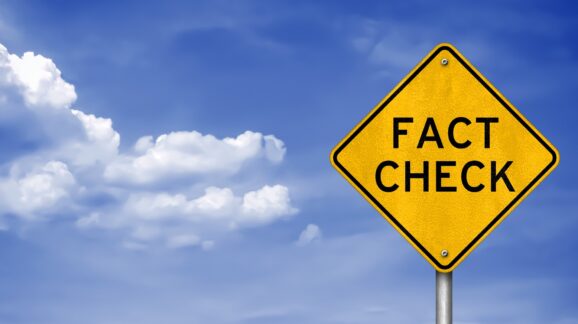in turn enable further types of interactions beyond the realm of business. The genius of the market is that it enables a wide array of individuals, groupings, and associations to organize spontaneously to advance their various interests in a cooperative fashion that yields win-win arrangements.
Featured Posts

Blog
Free the Economy podcast: Frontier economics with Kendall Cotton
In this week’s episode we cover the diamond jubilee of the Philadelphia Society, the cost of government regulation in the UK, the…

Blog
Bees are flourishing again. Thanks, capitalism!
You can relax, everyone: The honeybees are back. As Andrew Van Dorn of the Washington Post reported recently, America suddenly now has a record…

The Center Square
FACT CHECK: Biden touts inflation has “fallen”
CEI’s Ryan Young is cited in The Center Square on a Biden fact check: Ryan Young, senior economist at the Competitive Enterprise Institute, called…
Search Posts
Blog
Free the Economy Episode 4: Entrepreneurship and Equality with Alfredo Ortiz
Thanks to everyone for listening to and sharing the Competitive Enterprise Institute’s new podcast, Free the Economy. If you like the show, please leave…
Discourse
A Successful Abundance Agenda Must Address Americans’ Anxieties
f you flip through the pages or click on the website of any policy-minded publication these days, chances are you’ll come upon a discussion of…
Blog
Free the Economy Episode 3: Washington’s 10,000 Commandments
Thanks to everyone for listening to the first two episodes of the Competitive Enterprise Institute’s new podcast, Free the Economy. We’ve got more great…
Blog
Free the Economy Episode 2: Defending the American Dream
Thanks to everyone who listened to the inaugural episode of the new Competitive Enterprise Institute podcast Free the Economy in December. We covered stagnating wages,…
Blog
Free the Economy Episode 1: Deregulating Abundance
Free the Economy is a new podcast from the Competitive Enterprise Institute focused on how we all can become happier, healthier, and wealthier in a…
The American Spectator
What Do Americans Really Think of ‘ESG’ Investing?
Investing to promote environmental, social, and governance (ESG) outcomes — rather than to just maximize profit — became the hot topic in finance this year…
Products
Corporate Governance
Retirement Security Congress passed the Employee Retirement Income Security Act (ERISA), which governs private pensions, in 1974, in response to widespread concerns at the time…
Blog
Living in Capitalism: The Fat of the Land
Some of capitalism’s critics like to depict a market economy as a ruthless system in which making a living and paying expenses is inherently (or…
National Review
ESG Isn’t Going Away Anytime Soon
While the “Red Wave” never emerged in this November’s midterm elections, the issues that have riled up conservative voters the most in the past two years…
Law & Liberty
Capitalism’s Cure for Economic Sins
Philosopher and business ethics expert James Otteson of the University of Notre Dame wants to save you from the error of your ways, and by…
Blog
Retro Review: Jared Diamond—Guns, Germs, and Steel: The Fates of Human Societies (Norton, 1997)
In 1972, Jared Diamond was researching bird evolution in New Guinea. While walking along a beach, he had an hour-long conversation with a local politician…
Reason
FBI Reports Dubious ‘Trend’ of Rideshare Driver Kidnappings
“Fund managers who handle retirement accounts through the EBSA are being told to consider climate change and other environmental, social, and governance (ESG)…
Blog
Seizing the Ecomodernist Moment
I recently had the good fortune to attend Ecomodernism 2022, a conference hosted in northern Virginia by the Breakthrough Institute. The theme was “Deregulating…
Issues & Insights
A Supermarket Merger Is Not A Threat To Humanity
Grocery store giants Kroger and Albertsons have announced a proposed merger, but it’s a business combination that will likely come under undue antitrust scrutiny. Before the…
Blog
Jason Feifer on Managing Change in Life and Society
I recently wrote a review of Build for Tomorrow, the new book from Entrepreneur magazine editor-in-chief Jason Feifer. The book is a…
Coin Desk
Against CBDCs and the Politicization of Money
Tensions burst out between Rep. Rashida Talib (D-Mich.) and JPMorgan Chase CEO Jamie Dimon last week at a Capitol Hill hearing over whether the U.S.
Yahoo Finance
Against CBDCs and the Politicization of Money
Tensions burst out between Rep. Rashida Talib (D-Mich.) and JPMorgan Chase CEO Jamie Dimon last week at a Capitol Hill hearing over whether the U.S.
Blog
The Founding Fathers and Free Trade
There is an ongoing small cottage industry of historical revisionism aimed at showing that America since its founding was friendly to protectionism and that this…
Blog
Progressives Need Democracy, Not Technocracy
As Democrats debate the merits over legislative versus administrative action on topics ranging from climate change to gun control, they face a fundamental decision: technocracy…
Law & Liberty
Zero Impact’s Grim Cost
Philosopher and energy expert Alex Epstein sets himself two goals in his new book, Fossil Future—one significantly more difficult than the…
Blog
Green Politics Leads to Higher Gas Prices
Americans have been plagued by high gas prices in recent months, with recent polls showing fuel costs at the top of the list of…
Law & Liberty
A Declaration of Independence from the Administrative State?
At gatherings this July 4, there will likely be impassioned conversations about recent Supreme Court decisions. But it’s a ruling a few weeks ago from…
Blog
Crisis Abuse in History
Last week, CEI released Wayne Crews’s paper proposing an Abuse of Crisis Prevention Act. (If you prefer the short version, see Wayne’s and my…
RealClearInvestigations
It’s Conservative David vs. the Woke Corporate Green Giant
RealClearInvestigations cites CEI Senior Fellow Richard Morrison on woke capitalism: Among those fueling the backlash against “woke capital” or “stakeholder capitalism,” Soukup counts entrepreneur-turned-author and…
National Review
Free Enterprise Is the Basis of Prosperity
Free enterprise is under attack from across the political spectrum. Socialists and their allies regard it a source of corruption and as antithetical to democracy.
National Review
Free Enterprise Is the Basis of Prosperity
Free enterprise is under attack from across the political spectrum. Socialists and their allies regard it a source of corruption and as antithetical to democracy. Some…
Finger Lakes Times
Commentary: Diversity training is unpopular because it doesn’t work (but companies could change that)
Diversity is one of the hottest topics in corporate management today. And while corporate managers have been implementing diversity initiatives since at least the 1960s,…
Real Clear Policy
SEC’s Gensler Wants to Regulate Green Funds, But Definitions Are Elusive
In a recently released video, Securities and Exchange Commission (SEC) chairman Gary Gensler explains his concerns about investment products that market themselves as…
Blog
GDP Shrinks: The Good and the Bad
The advance estimate for 2022’s first quarter gross domestic product (GDP) is in, and the news is not good. Adjusting for inflation, GDP shrank…
Action Institute
Do Libertarians Have a Political Home Anymore?
For many years, libertarians and economic conservatives lived in harmony. The philosophy of fusionism said that the conservative party, when it governed, would seek to…
Blog
The Updated Case for Free Trade
Trade is a core value of civilization. The very act of trade implies respect for people’s rights. Suppose you have something I want. I could…
Blog
Pay College Athletes
No March Madness tournament would be complete without at least one school being caught paying its players in violation of NCAA rules. This year, the…
Blog
Climate Overreach at the SEC: What Comes Next
The Securities and Exchange Commission (SEC) today voted to recommend new proposed rules by which public companies would be required to disclose additional information about…
Blog
Correcting a Couple of Inflation Whoppers
Over at National Review’s Capital Matters site, I have a piece pointing out that today’s high gas prices aren’t caused by inflation. They’re caused…
Blog
Antitrust Is Political
Antitrust regulation is just as politicized as other forms of regulation. Arizona attorney general Mark Brnovich’s just-announced investigation into investors whose politics he doesn’t like…
The Washington Times
What Would George Washington Have Done?
The Washington Times cites Senior Fellow John Berlau on his book, George Washington, Entrepreneur: John Berlau has just written a most interesting book, “…
Blog
George Washington, Larry David, Cryptocurrency, and Freedom
One of the most talked-about Super Bowl ads was that of Larry David traveling through history and naysaying innovations that turned out to be hugely…
Blog
Staying the Course for Liberty
At the Competitive Enterprise Institute, we focus on policy issues ranging from tech and telecommunications to energy and the environment to financial regulation and monetary…
Blog
In Memoriam: P.J. O’Rourke
From Rolling Stone to nearly 20 rollicking books, P.J. O’Rourke explained the inexplicable, from war and every imaginable human privation to the peccadillos of Congress…
News Release
CEI Welcomes Communications Expert to Center for Advancing Capitalism
The Competitive Enterprise Institute is pleased to welcome writer, communications expert, and political scientist Joshua Bandoch as a Research Fellow in its Center for…
News Release
House Democrats’ China Bill Would Make the U.S Less Competitive and Harm Consumers
The House of Representatives is considering the America COMPETES Act this week, a bill described by sponsors as a “China competition bill.” The wide-ranging legislation…
Fee Stories
Where Have All the Capitalists Gone?
Economist Richard Salsman presents liberty advocates with a striking rhetorical question in the title of his most recent book. Are there really fewer capitalists than ever…
Blog
Retro Book Reviews: A Capitalism for the People: Recapturing the Lost Genius of American Prosperity by Luigi Zingales (Basic Books, 2012)
University of Chicago economist Luigi Zingales’s book A Capitalism for the People: Recapturing the Lost Genius of American Prosperity, which celebrates its 10th anniversary…
Blog
Which Classic Books Deserve a Retro Review in 2022?
Every year, there’s a tsunami of new books about economics, politics, and public policy that are full of hot takes and policy recommendations. In any…
Blog
Edmans, Soukup, and Devine: 2021 Book Review Roundup
We saw some great books on economics and politics published over the past year, and some excellent book reviews. Just this week, my colleague Ryan…
Blog
Review of Vivek Ramaswamy’s Woke, Inc.
Vivek Ramaswamy—pharmaceutical entrepreneur, son of immigrants, Yale Law grad, Hindu, and political conservative—is a capitalist with a lot of strong criticism for big business today.
Blog
Best Books of 2021: Ryan Bourne, Economics in One Virus (Cato Institute, 2021) and Caleb Fuller, There Is No Free Lunch (Freiling, 2021)
Economists are an unpopular bunch. One reason for this is that much of their job is putting parameters on people’s utopias. Spending more money…
Blog
Seven Quotes about Communism
Years ago, I pulled together some quotations about Communism that I thought would make good epitaphs for what I believed was a dying ideology. Unfortunately,…
Blog
Review of Michael Munger, The Sharing Economy: Its Pitfalls and Promises (Institute of Economic Affairs, 2021)
Transaction costs are one of the most overlooked ideas in economics. They are also one of the most important. The lowering of transaction costs is…
National Review
The Race-Marxists Finally Went Too Far
What good American would disagree that “black lives matter”? Who could be opposed to “diversity, equity, and inclusion”? Who doesn’t believe…
Newsweek
The Shaky Case for Mandating Gender Diversity on Corporate Boards
It’s a good time to be a female business executive in America. The percentage of firms with female CEOs is rising, and a …
Blog
New Analysis on ESG Investing: Friedman, Edmans, and Materiality
At times it seems like public events on environmental, social, and governance (ESG) investing are a dime a dozen; some think tank, consulting firm, or…
Blog
I, Pencil Meets Today’s Political Realignment
Conservatives are different than they were just a few years ago, and it isn’t just because of Trump, who is more a symptom than a…
Blog
The 2021 Economics Nobels: The Importance of Empiricism, and its Limits
The economics Nobel is given to individuals, but it often really intends to recognize schools of thought or methodological approaches. That is the case with…
Blog
Retro Review: The Social Responsibilities of Business (1970)
The Biblical book of Ecclesiastes reminds us that “there is no new thing under the sun.” Even centuries before the modern era, our ancestors…
Blog
Federalist Society Experts Duel on Climate Risks and Regulation
Earlier this week, the Federalist Society presented a panel discussion titled “Corporate Social Responsibility, Investment Strategy, and Liability Risks” that addressed some important issues…
Blog
Fighting Bias and Misinformation, from Pierre Bayle’s 17th Century to the Social Media Age
Many people insist that media bias and misinformation are getting worse in the social media age, and we need to do something about it. Depending…
Real Clear Policy
Don’t Force a One-size-fits-all Framework On Social Investors
Interest in environmental, social, and governance-themed, or ESG, investing has seen significant growth in recent years, but it has been matched by persistent complaints from…
Blog
Capitalism and Corporations: Respect Stakeholders, But Follow the Law
Last week the Law & Economics Center at George Mason University hosted a fascinating event here in Washington, D.C. on the debate over shareholder…
National Review
Economic Tea Party, R.I.P.
National Review Online’s esteemed editor, Philip Klein, asked an important question last week. Referring to the lack of opposition to the president’s big-spending agenda, he …
Law & Liberty
A Lawless Environmental Agenda
Recently a Dutch district court issued an unusual decision ordering oil company Royal Dutch Shell to dramatically reduce its greenhouse gas emissions by…
National Review
Biden’s Executive Order Moves the U.S. One Step Closer to Rule by Decree
President Biden’s sweeping executive order on competition is a strange beast. It lurches from lofty claims about encouraging competition to niggling complaints about…
Inside Sources
The Case Against a Universal Basic Income
The financial dislocations of the novel coronavirus pandemic and the unprecedented cash benefits that policymakers implemented in response have sparked renewed interest in an old…
Forbes
How Regulation Creates an Elite Investor Class
Forbes cites Senior Fellow John Berlau on his book, George Washington, Entrepreneur: How Our Founding Father’s Private Business Pursuits Changed America and the World:…
Comment
Public Input on Climate Change Disclosures: Questions for Consideration
View Full Document as PDF Dear Commissioner Lee, Please find below comments from the Competitive Enterprise Institute (CEI) in response to selected questions…
The Foundation for Economic Education
What ‘The Enduring Tension’ Can Teach Us about the Core Institutions of Our Civilization
Don Devine’s ambitious new volume is that rare published work that delivers an even larger and broader message than its title promises. A focus on…
Blog
New Study: Defusing the ESG Threat to Shareholder Rights
Today the Competitive Enterprise Institute published my new study on theories of enlightened investing, Environmental, Social, and Governance Theory: Defusing a Major Threat to…
Study
Frequently Asked Questions on ESG Theory
View Full Document as PDF Q: What does “ESG” stand for? A: ESG is short for “environmental, social, and governance.” It is a…
Study
Environmental, Social, and Governance Theory
View Full Document as PDF EXECUTIVE SUMMARY The concept known as environmental, social, and governance (ESG) theory has a long history of similar,…
Blog
Expect Search for Corporate Virtue to Get Increasingly Expensive
Last week I wrote about a video from the Financial Times that was meant to explain environmental social, and governance (ESG) investing. Despite…
Blog
Don’t Believe the Hype: ESG Investing Advice Hides Serious Flaws
In a recent video for the “Moral Money” section of the Financial Times, reporter Brooke Fox took on the question “What does ESG-friendly really…
The Dispatch
The Rejection of Globalism—on the Left and the Right—Is Changing Our Political Alignments
Many traditional conservatives are dumbstruck when they see Republicans like Missouri Sen. Josh Hawley or venture capitalist/potential candidate J.D. Vance espousing what they regard as…
FEE
Got Woke: A Review of ‘The Dictatorship of Woke Capital’
How did corporate America, long considered one of the most conservative American institutions, become a lead protagonist in a culture war over all manner of…
Blog
Americans Ambivalent about Billionaire Influence, Reject Left-Wing Hostility
New polling, recently written up at Reason, shows that the American public isn’t nearly as hostile to capitalism, and the leaders of big…
National Review
Corporations Don’t Pay Corporate Taxes. People Do
A mammoth infrastructure bill is on the way from Congress, and policy-makers are touting a corporate-tax-rate hike to help pay for it. Treasury secretary…
Blog
Book Review: Open: The Story of Human Progress by Johan Norberg
On March 25, 2021 at noon ET, CEI is hosting a double book forum featuring Johan Norberg, the 2019 winner of CEI’s Julian L. Simon…
Blog
Perspectives on “Woke Capital” and Politicized Investing
Recently, the Competitive Enterprise Institute hosted a virtual book event for Political Forum publisher Steve Soukup’s new book, The Dictatorship of Woke Capital:…
Blog
Adam Smith Slavery Controversy Can be Settled by his Writings
According to Britain’s Daily Telegraph, the grave of Adam Smith in his home city of Edinburgh has been included in a citywide review as…
News Release
CEI Celebrates Fred L. Smith, Jr.’s 80th Birthday with Anthology of His Writing
Fred L. Smith, Jr. celebrated his 80th birthday just before the New Year, and his friends and colleagues at the Competitive Enterprise Institute…
Study
Labor of Love: A Fred Smith Story
View Full Book as PDF Edited by Kent Lassman, Amanda France, and Ivan Osorio INTRODUCTION View Introduction as PDF Everyone…
News Release
Richard Morrison Statement on the Confirmation Hearing of Gary Gensler to Be SEC Chair
Senior Fellow Richard Morrison reacted to the confirmation hearing of Gary Gensler to be SEC Chair: “Chairman-designate Gensler’s prepared remarks for today’s confirmation hearing…
C-SPAN
VIDEO: The Dictatorship of Woke Capital on C-SPAN
C-SPAN shared CEI’s virtual discussion of the just published The Dictatorship of Woke Capital: How Political Correctness Captured Big Business with author Steve Soukup in…
Blog
Federalist Society and SEC’s Roisman on Future of ESG, Corporate Governance
Yesterday the Federalist Society held an excellent virtual event on corporate social responsibility (CSR) and environmental, social and governance (ESG) theory, addressing “the divergent…
The Jim Bohannon Show
AUDIO: John Berlau Joins Jim Bohannon to Discuss His Book “George Washington, Entrepreneur.”
Senior Fellow John Berlau joins Jim Bohannon to discuss his book “George Washington, Entrepreneur.”…
WCHV's Joe Thomas in-the-morning
AUDIO: John Berlau Joins WCHV’s Joe Thomas in-the-morning
Senior Fellow John Berlau joins WCHV’s Joe Thomas in-the-morning to discuss his new book, George Washington, Entrepreneur.
Blog
Upcoming CEI Event: Bart Wilson on The Property Species
At noon ET on Thursday, February 11, CEI is hosting an event with the experimental economist Bart Wilson, author of The Property…
Blog
CEOs Join Davos Wonks to Launch New Corporate ESG Disclosures
Axios’ “cheerful iconoclast” Felix Salmon reported earlier this week on an agreement by dozens of major corporations to support a new system of…
Blog
BlackRock’s Larry Fink: Fight COVID with Climate Activism
Larry Fink, CEO of mega asset management firm BlackRock, has released his annual pair of letters—one to the CEOs of companies that BlackRock holds…
Ricochet
AUDIO: Iain Murray Discusses Socialism on Action Line Podcast
Vice President for Strategy and Senior Fellow Iain Murray joins “Action Line” to discuss the reasons why socialism is not an effective method for reducing…
Blog
2020 Was Difficult. It Was Not the Worst Year Ever
It’s been a hard year, and I am hardly alone in being glad it’s almost over. But was 2020 the worst year ever? Over…
Blog
Best Books of 2020: Joseph Henrich – The WEIRDest People in the World: How the West Became Psychologically Peculiar and Particularly Prosperous
It’s early, but The WEIRDest People in the World: How the West Became Psychologically Peculiar and Particularly Prosperous by Joseph Henrich will likely be…
Blog
Best Books of 2020: Virgil Henry Storr and Ginny Seung Choi – Do Markets Corrupt Our Morals? (Palgrave MacMillan, 2019)
Most people see markets as dens of greed and moral corruption. In their new book, Do Markets Corrupt Our Morals?, Virgil…
The American Spectator
Money Isn’t Ruining Christmas
ost of us love the idea of a snow-filled white Christmas, but secretly dread the accompanying blizzard of commentary about how we ruin the season…
Blog
Some Frequently Asked Questions about Socialism
During my virtual “tour” for the release of my book, The Socialist Temptation, certain questions came up regularly. I have already set out my…
Blog
Walter Williams, 1936-2020
Walter Williams passed away this week at age 84. He was the rare economist to succeed as both an academic and a popular communicator.
Blog
Biden Team Expected to Take Hatchet to Pension Protection Rule
The Department of Labor, under the leadership of Secretary Eugene Scalia, implemented an important (though widely misunderstood) rule this year, regarding how federally regulated pension…
Blog
Retro Review: The Communist Manifesto (1848)
The manifesto of the Communist party, written by Karl Marx and Friedrich Engels in 1847 and first published the next year, has a legendary pair…
Blog
Millennials, Gen Z Optimistic about Hard Work Leading to Prosperity
The Walton Family Foundation released an interesting survey recently that found that Generation Z (ages 13–23) and Millennial (ages 24–39) Americans are more optimistic…
Watch Rushing In: The John Wood Story
New CEI Documentary Spotlights Entrepreneur Who Kept Diner Open To Feed Thousands during Lockdowns
During this pandemic and time of social unrest, many people wish they could take action and might not think that small, organized steps could positively…
WilliamsonHerald
Obituary: Dr. Christopher Lee Culp
WilliamsonHerald cites Competitive Enterprise Institute former adjunct fellow Dr. Christopher Lee Culp. It is with great sadness that the family of Dr. Christopher Culp shares…


